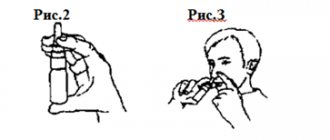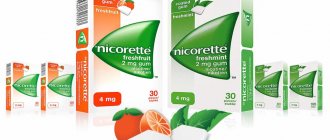Nosological classification (ICD-10)
- E14.5 Diabetic ulcer
- H10.9 Conjunctivitis, unspecified
- H57.9 Disorder of the eye and adnexa, unspecified
- I73.9 Peripheral vascular disease, unspecified
- I84 Hemorrhoids
- I87.2 Venous insufficiency (chronic) (peripheral)
- J00 Acute nasopharyngitis [runny nose]
- J01 Acute sinusitis
- J01.0 Acute maxillary sinusitis
- J01.1 Acute frontal sinusitis
- J01.9 Acute sinusitis, unspecified
- J06 Acute upper respiratory tract infections of multiple and unspecified localization
- J31.0 Chronic rhinitis
- J32 Chronic sinusitis
- J32.0 Chronic maxillary sinusitis
- J32.1 Chronic frontal sinusitis
- J32.9 Chronic sinusitis, unspecified
- K12 Stomatitis and related lesions
- K13.7 Other and unspecified lesions of the oral mucosa
- L58 Radiation radiation dermatitis
- L98.4.2* Trophic skin ulcer
- N76 Other inflammatory diseases of the vagina and vulva
- R02 Gangrene, not elsewhere classified
- T14.1 Open wound of unspecified body area
- T30 Thermal and chemical burns of unspecified location
- T35 Frostbite involving multiple areas of the body and unspecified frostbite
Desrinit, 1 piece, 18 g, 50 mcg/dose, metered nasal spray
When using mometasone for 12 months, there were no signs of atrophy of the nasal mucosa.
A study of biopsy samples of the nasal mucosa revealed that mometasone tended to normalize the histological picture.
When using the drug for a long time (as with any long-term treatment), periodic examination of the nasal mucosa by an otolaryngologist is necessary.
If a local fungal infection of the nose or pharynx develops, it is recommended to stop treatment with the drug and begin specific therapy.
Irritation of the mucous membrane of the nasal cavity and pharynx that persists for a long time is an indication for discontinuation of the drug. With long-term use of the drug, no signs of suppression of the function of the hypothalamic-pituitary-adrenal system were observed. Patients who switch to mometasone therapy after long-term treatment with systemic GCS require special attention. Withdrawal of systemic corticosteroids in such patients may lead to adrenal insufficiency, which may require appropriate measures. During the transition from treatment with systemic corticosteroids to mometasone therapy, some patients may experience withdrawal symptoms of systemic corticosteroids (for example, joint and/or muscle pain, fatigue, depression), despite a decrease in the severity of symptoms associated with damage to the nasal mucosa , such patients must be specifically convinced of the advisability of continuing treatment with Desrinit.
The transition from systemic corticosteroids to local corticosteroids may also reveal pre-existing allergic diseases, such as allergic conjunctivitis and eczema, that were masked by systemic corticosteroid therapy.
The effectiveness and safety of mometasone have not been studied in the treatment of unilateral polyps, polyps associated with cystic fibrosis, and polyps that completely occlude the nasal cavity. Unilateral polyps that are irregular in shape or bleeding should be further examined. Patients undergoing GCS therapy have a reduced immune reactivity and should be warned about the increased risk of infection when contacting patients with certain infectious diseases (for example, chicken pox, measles), as well as the need for medical consultation if such contact occurs.
With long-term use of nasal corticosteroids in high doses, systemic side effects may develop. The likelihood of developing these effects is much less than with the use of systemic corticosteroids and may vary in individual patients, as well as between different corticosteroids. Potential systemic effects include Cushing's syndrome, Cushingoid features, adrenal suppression, growth retardation in children and adolescents, cataracts, glaucoma, and less commonly, a number of psychological or behavioral effects including psychomotor hyperactivity, sleep disturbance, anxiety, depression, or aggression (especially in children). It is recommended to regularly monitor the growth of children receiving long-term therapy with mometasone. If growth slows, therapy should be reconsidered in order to reduce the dose of mometasone to the minimum effective dose to control the symptoms of the disease. In addition, the patient should be referred to a pediatrician for consultation. Treatment of GCS with higher doses than recommended may lead to clinically significant suppression of adrenal function. If high doses of corticosteroids are known to be used, the possibility of additional use of systemic corticosteroids should be considered during periods of stress or planned surgery.
Impact on the ability to drive vehicles and machinery.
No studies have been conducted to study the effect on the ability to drive vehicles and machinery.
Pharmacodynamics
The drug activates cellular and humoral immunity. Optimizes specific responses against fungal, viral and bacterial infections. The drug stimulates reparative and regenerative processes, normalizes the condition of tissues and organs in dystrophies of vascular origin. Derinat® promotes the healing of trophic ulcers of various etiologies, as well as the rapid healing of deep burns, significantly accelerating the dynamics of epithelization. When ulcerative formations on the mucous membrane are restored under the influence of the drug, scarless restoration occurs. Derinat® does not have teratogenic or carcinogenic effects.
Indications for the drug Derinat®
Monotherapy:
acute respiratory infections;
prevention and treatment of ARVI;
ophthalmology - inflammatory and dystrophic processes;
inflammatory diseases of the mucous membranes of the oral cavity.
Complex therapy:
chronic inflammatory diseases, fungal, bacterial and other infections of the mucous membranes in gynecology;
acute and chronic diseases of the upper respiratory tract (rhinitis, sinusitis, sinusitis, sinusitis);
obliterating diseases of the lower extremities;
trophic ulcers, long-term non-healing and infected wounds (including diabetes mellitus);
gangrene;
burns, frostbite;
haemorrhoids;
post-radiation necrosis of the skin and mucous membranes.
Directions for use and doses
Externally, locally.
The drug is prescribed to children from the first day of life and to adults.
To prevent ARVI, instill 2 drops into each nasal passage 2–4 times a day for 1–2 weeks.
For acute respiratory infections, acute respiratory viral infections, the drug is instilled into the nose, 2-3 drops into each nasal passage every 1-1.5 hours, during the first day; further - 2-3 drops in each nasal passage 3-4 times a day, course duration - 1 month.
For inflammatory diseases of the nasal cavity and paranasal sinuses, the drug is instilled 3-5 drops into each nasal passage 4-6 times a day. Course duration is 7–15 days.
For diseases of the oral mucosa, rinse with the drug 4-6 times a day (1 vial - 1-2 rinses). The duration of treatment is 5–10 days.
For chronic inflammatory diseases, fungal, bacterial and other infections in gynecology - intravaginal administration with irrigation of the cervix or intravaginal administration of tampons with the drug, 5 ml per procedure, 1-2 times a day for 10-14 days.
For hemorrhoids, the drug is prescribed as microenemas of 15–40 ml into the rectum. The duration of treatment is 4–10 days.
For severe inflammatory and dystrophic processes in ophthalmology, Derinat® is instilled into the eyes 2-3 times a day, 1-2 drops, for 14-45 days.
For obliterating diseases of the lower extremities, the drug is instilled 1-2 drops into each nasal passage 6 times a day, the course duration is up to 6 months.
For post-radiation necrosis of the skin and mucous membranes, long-term non-healing wounds, burns, frostbite, trophic ulcers of various etiologies, gangrene, application bandages (gauze in two layers) are applied to the affected areas with the drug applied to it 3-4 times during the day (course of treatment - 1–3 months).
Derinat, spray 0.25% 10 ml
Manufacturer
FZ Immunnolex, Russia
Compound
1 ml of solution contains sodium deoxyribonucleate – 2.5 mg,
sodium chloride – 1.0 mg
pharmachologic effect
The drug activates cellular and humoral immunity. Optimizes specific responses against fungal, viral and bacterial infections. The drug stimulates reparative and regenerative processes, normalizes the condition of tissues and organs in dystrophies of vascular origin.
Derinat promotes the healing of trophic ulcers of various etiologies. Derinat promotes rapid healing of deep burns, significantly accelerating the dynamics of epithelization. When ulcerative formations on the mucous membrane are restored under the influence of Derinat, scarless restoration occurs. The drug does not have teratogenic or carcinogenic effects.
Pharmacokinetics:
Derinat, when applied topically, is quickly absorbed and distributed in organs and tissues via the endolymphatic transport route. During the phase of intensive entry of the drug into the blood, redistribution occurs between plasma and blood cells, in parallel with metabolism and excretion. Derinat is metabolized in the body.
It is excreted from the body (in the form of metabolites) partially with feces, and, to a greater extent, with urine according to a biexponential dependence.
Indications
Monotherapy:
- acute respiratory diseases (ARI);
- prevention and treatment of acute respiratory viral infections (ARVI);
- ophthalmology: inflammatory and dystrophic processes;
- inflammatory diseases of the mucous membranes of the oral cavity;
Complex therapy:
- chronic inflammatory diseases, fungal, bacterial and other infections of the mucous membranes in gynecology;
- acute and chronic diseases of the upper respiratory tract (rhinitis, sinusitis, sinusitis, sinusitis);
- obliterating diseases of the lower extremities;
- trophic ulcers, long-term non-healing and infected wounds (including diabetes mellitus);
- gangrene;
- burns, frostbite;
- haemorrhoids;
- post-radiation necrosis of the skin and mucous membranes.
Contraindications
- hypersensitivity to the components of the drug.
Side effects
No side effects were identified with external or local use of the drug.
How to take, course of administration and dosage
Derinat in the form of a solution for external and local use is prescribed depending on the location of the pathological process. The drug is prescribed to children from the first day of life and to adults. To prevent ARVI, instill 2 drops into each nasal passage 2-4 times a day for 1-2 weeks.
When symptoms of a respiratory disease appear, the drug is instilled 2-3 drops into each nasal passage every 1-1.5 hours during the first day, then 2-3 drops into each nasal passage 3-4 Duration of therapy - from 5 days to 1 month . For inflammatory diseases of the nasal cavity and paranasal sinuses, the drug is instilled 3-5 drops into each nasal passage 4-6 times a day; Course duration is 7-15 days. For inflammatory diseases of the oral cavity, rinse the mouth with a solution of the drug 4-6 times a day (1 bottle for 2-3 rinses). The duration of the course of therapy is 5-10 days.
For chronic inflammatory diseases, fungal, bacterial and other infections in gynecological practice - intravaginal administration of tampons with the drug or irrigation of the vagina and cervix, 5 ml per procedure 1-2 times a day for 10-14 days. For hemorrhoids, the drug is administered rectally using microenemas of 15-40 ml.
The duration of treatment is 4-10 days. In ophthalmological practice, for severe inflammatory and dystrophic processes, Derinat is instilled into the eyes, 1-2 drops 2-3 times a day for 14-45 days. For obliterating diseases of the lower extremities, in order to achieve a systemic effect, the drug is instilled 1-2 drops into each nasal passage 6 times a day, the course duration is up to 6 months.
In case of post-radiation necrosis of the skin and mucous membranes, with long-term non-healing wounds, burns, frostbite, trophic ulcers of various etiologies, gangrene, it is recommended to apply application bandages (gauze in 2 layers) to the affected areas with the application of the drug 3-4 times a day or treat the affected area surfaces with the drug from a spray bottle 10-40 ml 4-5 times a day. The course of treatment is 1-3 months.
Release form
Spray.
Storage conditions
It is recommended to store the drug in a dry place, protected from light, at a temperature of 4° to 18°C.
Active substance
Sodium deoxyribonucleate
Dosage form
nasal spray
Purpose
For children, For pregnant women, Nursing mothers, For adults
Indications
Hemorrhoids, Burns, Sinusitis, Runny nose, Trophic ulcers, Prevention of influenza and colds, Bedsores, Influenza, Frostbite, Colds, Inflammation of the female genital organs, Sinusitis
Barcode and weight
Barcode: 4605962000349, 4607173030108 Weight: 0.040 kg

